 Many nights after she finished treating patients at UAB’s Hoover Family Medicine clinic this spring, Sumayah Abed, M.D., assistant professor and family physician, sat down with a stack of documents and painstakingly translated them into Arabic, often emailing her father in Iraq to double-check her work.
Many nights after she finished treating patients at UAB’s Hoover Family Medicine clinic this spring, Sumayah Abed, M.D., assistant professor and family physician, sat down with a stack of documents and painstakingly translated them into Arabic, often emailing her father in Iraq to double-check her work.
Language barriers create issues at all levels of health care for both patients and providers. Miscommunication is common and important health markers can be missed when a patient and their care team cannot communicate properly. Abed, M.D. set out to improve the way that Arabic-speaking patients receive care at UAB clinics and hospitals.
Abed is originally from Iraq and attended medical school in Mosul. Her first language is Arabic but she learned English at school and began using it regularly while working in Qatar as a women’s health physician in 2006. When she moved to the United States to complete her residency in Birmingham, she began noticing a gap in communication between Arabic-speaking populations and their health care teams.
Beginning in early 2021, Abed began a project to address these communication gaps. For more than three months Abed has used her time off to translate common patient-facing documents into Arabic. Abed worked closely with her father, Khalid, who still lives in Iraq to ensure the documents included correct grammar and sentence structure. He is an Arabic literature teacher for high school students.
So far, Abed has translated more than 10 educational documents commonly given to patients with illnesses like hypertension, diabetes, respiratory diseases, and many others. Abed’s translated documents are available to any UAB physician or care provider in the electronic medical record (EMR) system supported by UAB.
“The idea came to me because of the increasing number of Arabic-speaking patients in our clinics,” said Abed. “I wanted to create these Arabic educational materials to help our patients better understand their medical conditions.”
The greater Birmingham area is home to many Arab immigrants and Abed sees several each week in her clinic. For physicians treating these populations, many of whom speak Arabic as their first or only language, the language barrier can create issues in providing quality and comprehensive care in the clinic. Abed’s translated documents will ensure future interactions with physicians will be more accessible for Arabic-speaking patients.
The Department of Family and Community Medicine strives to build bridges to underserved populations through access to medical care and improving resources.